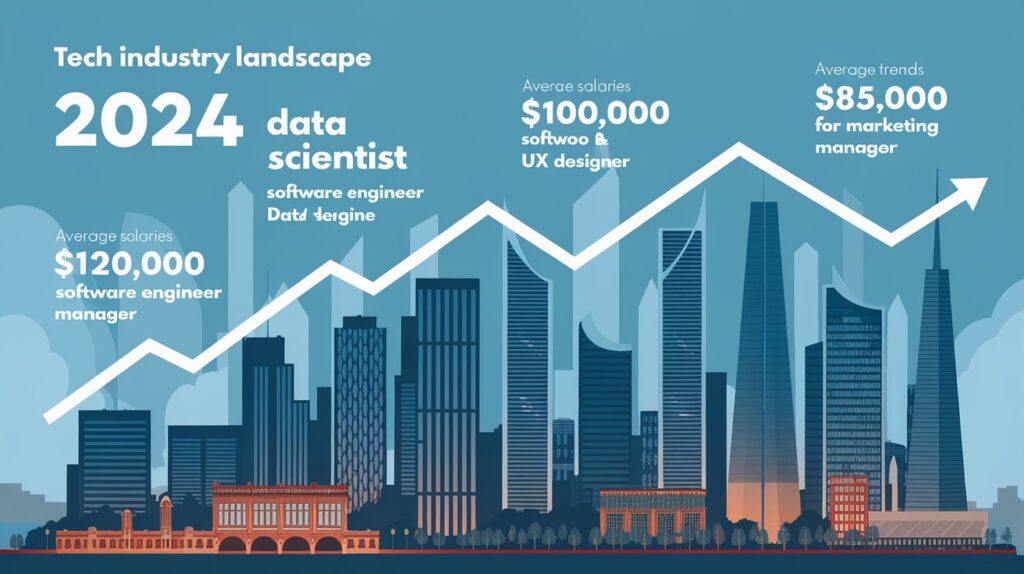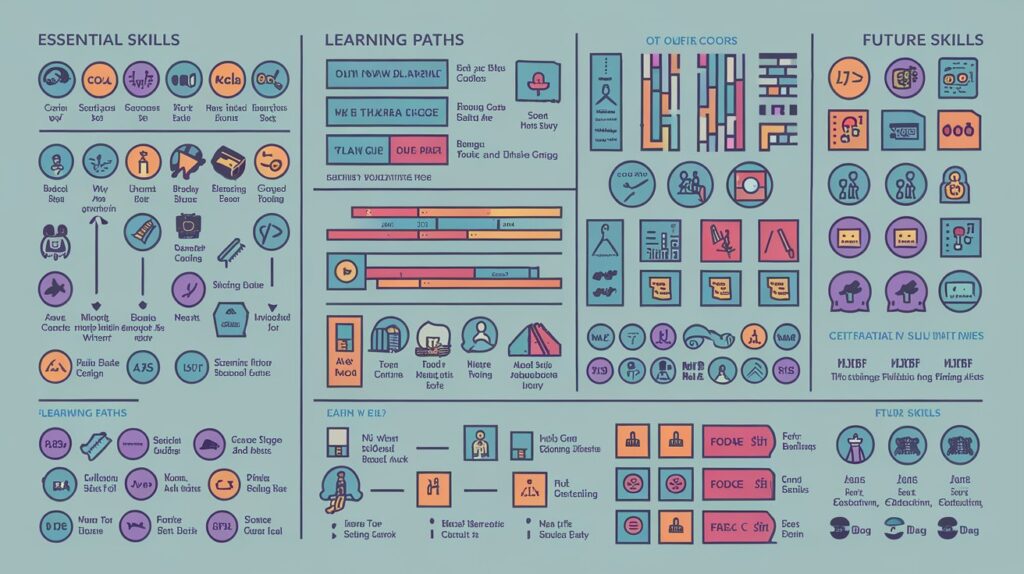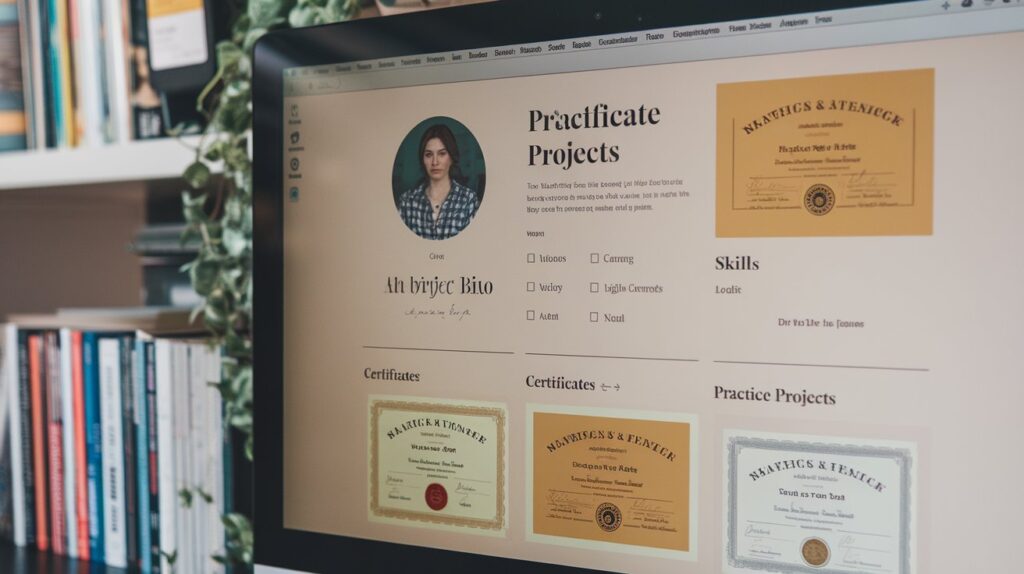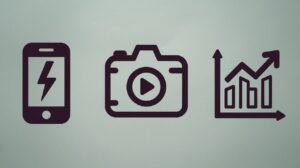Best tech jobs for career changers are increasingly available, thanks to a high demand for tech skills across various industries. As companies continue to value digital expertise, tech careers offer competitive salaries, dynamic growth opportunities, and the chance to pivot into roles like UX/UI design, web development, and data analysis. This guide provides career changers with key insights into entry-level roles, salary expectations, and the skills needed to make a smooth transition into the tech sector.
Read on to discover how to switch careers to tech, from building essential skills to developing a job-search strategy that leverages your background. Whether you’re interested in exploring entry-level tech jobs with no experience or you’re curious about tech career change salary guides, this comprehensive resource will cover everything you need to know to confidently navigate a tech career transition in 2024.
Estimated reading time: 9-10 minutes
Table of Contents

Best Tech Jobs for Career Changers: Complete Overview
Switching to a tech career offers a unique set of advantages, especially for those looking to transition into a field with high growth and ample opportunities. The tech industry provides career changers with diverse roles suited for various skill sets and backgrounds, making it an appealing choice for those wondering how to switch careers to tech. Here’s a closer look at the industry landscape, salary potential, and growth opportunities in tech.
Industry Landscape
The tech industry has seen immense growth over the past few decades, with demand for tech professionals continuing to rise. For those exploring entry-level tech jobs with no experience, the industry offers multiple roles with accessible entry points, such as UX/UI design, web development, and data analysis. Career changers can leverage their existing skills while upskilling in specific areas to meet job requirements in the tech world.
Salary Potential
One of the biggest incentives for making a career change to tech is the salary potential. Roles in tech are often well-compensated, and even entry-level positions offer competitive salaries compared to other industries. According to various tech career change salary guides, positions such as web developers, data analysts, and UX designers offer solid starting salaries, with opportunities for growth as skills and experience increase.
Growth Opportunities
Career changers benefit from the tech industry’s rapid innovation, which creates ongoing demand for professionals who can adapt and learn. Growth opportunities are abundant, with many tech roles leading to specialized and senior positions. For those asking what tech jobs are good for beginners, there are numerous paths for advancement, from mid-level roles to management positions, enabling career changers to evolve alongside industry developments. The demand for skilled tech workers shows no signs of slowing, making the tech sector a promising field for those seeking long-term growth.

Top Entry-Level Tech Jobs for Career Changers
For those looking to pivot into tech, identifying the best tech jobs for career changers is key. Many entry-level tech jobs are structured to welcome individuals with little to no experience, making the industry an ideal space for career transformation. Here’s a look at three popular paths that offer a strong starting point in the tech world: UX/UI design, web development, and data analysis.
UX/UI Design
For career changers with an eye for detail and an interest in creative problem-solving, UX/UI design provides a dynamic entry point into tech. This role focuses on improving user experiences and designing user-friendly interfaces, often blending creativity with tech skills. UX/UI designers are highly sought after, with demand growing as companies seek to enhance customer experiences. Learning paths are accessible, with various online courses and bootcamps available to help beginners develop the essential skills for UX/UI design, such as wireframing, prototyping, and user research.
Web Development
Web development remains one of the most popular choices among entry-level tech jobs for career changers, as it offers a balance of creative and technical work. With a focus on building and maintaining websites, web developers have plenty of opportunities, especially in fields seeking an online presence. There are numerous paths to enter web development, from front-end design to full-stack development. For those exploring how to switch careers to tech, web development roles provide valuable skills that are easily transferable across industries.
Data Analysis
Data analysis is a growing field that appeals to detail-oriented career changers interested in working with numbers and patterns. As organizations increasingly rely on data-driven decision-making, data analysts play a crucial role in interpreting and analyzing data to provide actionable insights. This role is one of the best tech jobs for career changers who enjoy problem-solving and critical thinking. Many entry-level data analyst positions require foundational skills in Excel, SQL, and data visualization tools, all of which can be learned through targeted online courses and practice projects.

Skills Guide: Best Tech Jobs for Career Changers
Transitioning to a tech career requires building a foundational skill set tailored to your chosen field. By understanding the essential skills, following effective learning paths, and leveraging valuable training resources, career changers can make a smoother shift into the tech world. Below, we explore the core skills and tools to start your journey toward the best tech jobs for career changers.
Essential Skills
To succeed in entry-level tech jobs, developing both hard and soft skills is crucial. Some of the most essential skills for tech roles include:
- Coding and Programming: Learning languages like Python, JavaScript, or HTML/CSS, depending on the role, is fundamental for fields like web development and data analysis.
- Problem-Solving: Analytical thinking and problem-solving are vital in tech, where roles often focus on improving systems, troubleshooting, and optimizing user experiences.
- Data Literacy: For those considering data analysis, understanding data concepts and tools, including Excel and SQL, can set you apart in the hiring process.
These core competencies form a solid foundation for those exploring how to switch careers to tech.
Learning Paths
Different learning paths offer flexibility and cater to a variety of entry-level tech jobs. Bootcamps, online courses, and certifications provide accessible, structured learning experiences. Bootcamps often cover intensive content over a few weeks or months, ideal for career changers looking to jump-start their knowledge. Meanwhile, online platforms like Coursera, Udacity, and Khan Academy offer in-depth courses that help learners develop skills at their own pace.
Training Resources
Training resources, from coding platforms to data analysis tools, make a tech career transition much smoother. Some popular tools for building skills for tech jobs include:
- GitHub: For developers, GitHub is a platform to share and practice coding projects, offering real-world experience and collaboration opportunities.
- Tableau and Excel: Data visualization tools like Tableau and Excel help those interested in data analysis interpret and present data effectively.
- Figma and Sketch: These tools are valuable for those pursuing UX/UI design, allowing users to create wireframes and interactive prototypes.
Access to these resources not only enhances technical proficiency but also builds a strong portfolio, which is essential for career changers seeking their first tech job.
Finding the Best Tech Jobs for Your Background
Choosing a tech role that aligns with your background is key to a successful career change. By considering skill transferability, industry alignment, and effective role selection, you can identify the best tech jobs for career changers that fit your unique experience. Below, we’ll explore how to leverage your existing skills and interests to make an informed transition into tech.
Skill Transferability
Many of the best tech jobs for career changers utilize skills you may already possess, such as project management, analytical thinking, or communication abilities. For example:
- Project Management: Skills in coordinating teams, timelines, and resources are highly valuable in tech project management and web development roles.
- Customer Insight: Experience in understanding customer needs translates well to UX/UI design and customer success roles, where user-centric thinking is essential.
- Analytical Skills: Proficiency in analyzing information can be transferred to data analysis, where interpreting trends and making data-driven decisions are crucial.
Identifying these transferable skills can help you match your experience to high-paying careers working with people in tech fields, such as product management or customer success.
Industry Alignment
Aligning your tech career choice with your industry experience can open unique opportunities. For instance, if you come from finance, data analysis or fintech roles may feel familiar, as they leverage industry knowledge and tech expertise. Similarly, individuals with a background in education may find roles in edtech or training technology particularly fulfilling, as they allow you to apply your subject knowledge to create tech solutions.
Matching your background to an aligned tech field not only shortens the learning curve but also adds value to your prospective role in the eyes of employers.
Role Selection
When choosing a tech job, consider roles that match your personality, strengths, and career aspirations. Here’s a quick look at popular tech jobs for career changers based on different professional backgrounds:
- Business Professionals: Project management, business analysis, or customer success roles often suit those from corporate settings.
- Creative Professionals: UX/UI design, digital marketing, and web development appeal to those with a creative edge.
- Analytical Thinkers: Data analysis, quality assurance, and research roles are ideal for those with a strong focus on detail and data interpretation.
Selecting a role that aligns with your background, whether it’s customer-focused or technical, can ease the transition and provide a rewarding start in the tech industry.

Building Experience for Tech Career Transition
For those seeking the best tech jobs for career changers, building hands-on experience is critical. Developing a strong portfolio, engaging in practice projects, and earning relevant certifications can demonstrate your commitment and abilities to prospective employers. Here’s how you can make your experience stand out in the competitive tech job market.
Portfolio Development
A well-rounded portfolio is essential for showcasing your skills, especially if you’re moving into fields like UX/UI design, web development, or data analysis. Include projects that highlight a variety of skills, such as coding, problem-solving, or user-centered design. If you’re new to tech, consider starting with smaller, achievable projects, like building a simple website or creating a basic data visualization.
- Showcase a Variety of Projects: Include different types of work that show off a range of skills relevant to your target job.
- Emphasize Results: When possible, describe the impact or outcome of your projects, such as improved user engagement or streamlined processes.
Practice Projects
To bridge the experience gap, engage in practice projects that reflect real-world scenarios. Platforms like GitHub, Behance, or Kaggle can offer great starting points, allowing you to showcase entry-level tech skills without formal job experience.
- Freelance or Volunteer Work: Offer your skills to small businesses or non-profits to gain experience. Volunteering for a local organization or freelancing small projects can give you portfolio-worthy material while helping you hone your skills.
- Online Competitions and Hackathons: Participating in tech competitions or coding challenges is another way to build practical experience and potentially collaborate with others, which is a valuable aspect of many tech roles.
Certifications Guide
Certifications can validate your skills, making you a more appealing candidate for entry-level tech jobs. They’re particularly valuable for career changers who need to showcase knowledge in specific tech areas. Here are some popular certifications based on different tech fields:
- UX/UI Design: Consider certifications from platforms like Coursera, LinkedIn Learning, or Skillshare that cover essential design principles, wireframing, and prototyping.
- Web Development: Explore options like the Google IT Support Certificate or FreeCodeCamp’s Responsive Web Design to learn core web development concepts.
- Data Analysis: For data enthusiasts, the IBM Data Science Professional Certificate or Google Data Analytics Certificate provides practical knowledge in Python, SQL, and data visualization.
Certifications not only add credibility to your resume but also give you a structured learning path to follow, making it easier to gain the necessary skills.
Landing Your First Tech Job as a Career Changer
Securing a position in the tech industry as a career changer requires effective resume building, focused interview preparation, and a proactive job search strategy. Here’s how you can set yourself up for success when pursuing the best tech jobs for career changers.
Resume Tips
Crafting a compelling resume is essential when transitioning to tech, as it serves as your first impression. Focus on highlighting transferable skills from your previous roles that are relevant to your target tech job. If you’re targeting entry-level tech jobs with no experience in tech, emphasize problem-solving abilities, analytical skills, or any technical training you’ve completed.
- Highlight Transferable Skills: Identify skills from your prior career that align with the tech field, such as project management, collaboration, or critical thinking.
- Add a Skills Section: Include technical skills relevant to the job, such as programming languages (Python, JavaScript) or tools (Excel, Figma).
- Showcase Projects and Certifications: List any portfolio projects or certifications you’ve earned that showcase your dedication to the transition.
Interview Preparation
Effective interview preparation can set you apart, especially if you’re new to tech. Employers hiring for tech jobs suitable for beginners may ask technical questions, even at entry level, so be prepared to discuss your knowledge, certifications, and how you’ve been practicing tech skills.
- Prepare for Technical Questions: Review fundamental concepts, especially if you’re interviewing for roles like data analysis or web development. Be ready to discuss project work from your portfolio.
- Practice Behavioral Responses: Employers want to know how you approach challenges. Practice responses that highlight problem-solving and adaptability, as these are key qualities for tech professionals.
- Show Enthusiasm for Learning: Since the tech landscape evolves quickly, showing a commitment to ongoing learning can reassure employers that you’re invested in your new career path.
Job Search Strategy
Finding a tech job as a career changer often requires a strategic approach. Begin by researching how to switch careers to tech and understanding which roles best align with your experience and goals. Networking is invaluable in the tech industry, so consider reaching out to industry contacts, joining relevant online communities, and attending tech events.
- Research Your Ideal Companies: Identify organizations that are open to hiring career changers or that offer entry-level positions. Companies focused on innovation or startups often value unique perspectives.
- Utilize Online Job Boards: Websites like LinkedIn, Indeed, and specialized tech boards (e.g., Stack Overflow Jobs) allow you to filter by entry-level tech jobs no experience required.
- Network Actively: Attend tech meetups, webinars, and events to connect with industry professionals. Building relationships can lead to job referrals and insider tips.
Employers in the tech field appreciate candidates who come prepared, demonstrate adaptability, and show a genuine passion for technology. With the right resume, interview preparation, and job search strategy, you’ll be well on your way to landing a rewarding tech position.

Success Stories: Career Changers in Tech
Transitioning to a tech career may feel daunting, but many have successfully made the switch and thrived in their new roles. Here, we highlight real examples of people who found the best tech jobs for career changers, illustrating effective timelines, strategies, and lessons learned.
Real Examples of Successful Career Changers
1. Sarah, from Marketing to UX/UI Design
Sarah spent seven years in marketing before shifting to a career in UX/UI design. Realizing her passion for creating engaging experiences, she completed an online bootcamp in design principles and built a portfolio of mock projects. In under a year, she secured her first role as a UX designer. Sarah credits her success to her project-based learning approach and dedication to refining her design skills.
2. Alex, from Education to Data Analysis
Alex was a high school teacher for eight years before he decided to transition into data analysis. With a background in mathematics and problem-solving, Alex completed courses in Python and data visualization. His previous experience analyzing student performance data proved beneficial, and within 18 months, he landed a junior data analyst role. Alex’s journey highlights the value of leveraging transferable skills and focusing on tech roles that suit past experience.
3. Michael, from Finance to Software Development
After 10 years in finance, Michael pursued a career in software development. Knowing the demand for developers, he invested time in learning JavaScript and building a portfolio of small web apps. Michael used job boards to target entry-level roles and networked with others making similar career changes. His persistence paid off, and he began his tech career in 14 months as a junior developer.
Transition Timelines for Career Changers
Each success story shows that the timeline for changing careers to tech varies widely, depending on the field and individual goals. While some, like Sarah, took under a year, others spent more time building skills and experience before landing their first role.
- Shorter Transitions (6-12 months): Ideal for people with existing transferable skills or those aiming for entry-level tech jobs with no experience needed, such as UX/UI design or digital marketing roles.
- Moderate Transitions (12-18 months): Common for career changers pursuing more technical roles, like data analysis or software development, who may need time to acquire technical skills and build a portfolio.
- Longer Transitions (18+ months): Typically for those aiming for specialized tech positions or senior roles in fields like cybersecurity, cloud engineering, or machine learning.
Proven Strategies for a Successful Career Transition
To succeed in your tech transition, consider adopting the strategies used by others who’ve found the best tech jobs for career changers.
- Invest in Skill-Building: Taking courses, attending bootcamps, or earning certifications is crucial for acquiring relevant tech skills. Platforms like Coursera, Udacity, and LinkedIn Learning offer accessible options for learning.
- Build a Portfolio: A portfolio demonstrates your abilities to potential employers. Include projects, mock tasks, or any relevant work showcasing your skills, especially if you’re targeting roles in design, development, or data.
- Network Actively: Many career changers cite networking as key to their success. Attend industry events, join tech meetups, and engage in online communities like LinkedIn or Twitter to connect with professionals who can provide guidance and referrals.
- Set Realistic Goals: Establish clear milestones for your learning and job search to keep motivated. Aiming for weekly or monthly targets can help you stay on track and make the process manageable.
With real examples and proven strategies, your journey into tech can be just as successful. By following the paths of those who’ve made similar transitions, you can gain insights and stay motivated as you work towards your career goals in the tech industry.
Conclusion
Transitioning into tech offers a world of opportunities for career changers, with roles that are not only adaptable but increasingly high-paying and in-demand. By exploring the best tech jobs for career changers, from UX/UI design and web development to data analysis and beyond, you can find a path that aligns with your unique skills, personality, and goals.
Switching careers may feel intimidating, but with a thoughtful approach, proper training, and practical experience, you’ll be well-equipped to make a successful leap. Remember, success stories from others who’ve made the transition show that a clear plan, consistent skill-building, and a commitment to networking can open the doors to your new career in tech.
No matter your background, with dedication and the right steps, you’ll find a rewarding tech role that lets you leverage your talents while adapting to the dynamic demands of the industry. Here’s to a successful career transition and an exciting journey into the tech world in 2024 and beyond!
References
- LinkedIn Talent Solutions. 2023 Workplace Learning Report. Available at: https://learning.linkedin.com/resources/workplace-learning-report
- CompTIA. IT Industry Outlook 2024. CompTIA Insights & Tools. Available at: https://www.comptia.org/content/research/it-industry-trends-analysis
- Bureau of Labor Statistics. Computer and Information Technology Occupations. U.S. Bureau of Labor Statistics. Available at: https://www.bls.gov/ooh/computer-and-information-technology/home.htm
These links provide relevant and updated insights on tech career shifts, skills, and job options.



